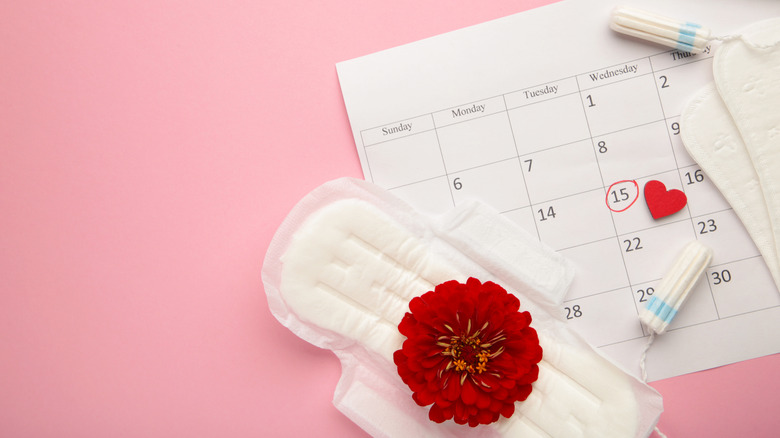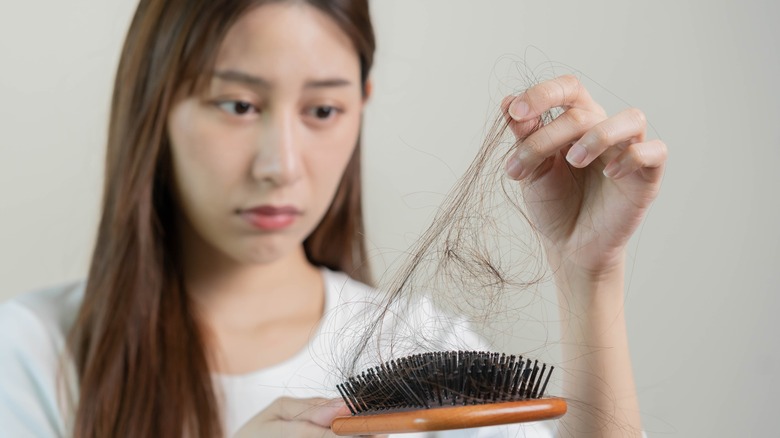13 Signs You're On The Wrong Birth Control
Birth control has been around for quite some time. When the pill was first introduced in the 1960s, it brought with it a slew of side effects that left many women feeling like they might be better off without it (via WebMD). Since then, birth control has made some incredible advances. Not only does the birth control of today deliver hormones in lower doses, but there is also a range of methods to choose from, like pills, rings, patches, and intrauterine devices (IUDs), per Planned Parenthood.
While many use hormonal contraception to prevent pregnancy, this medication can also help treat conditions related to the menstrual cycle, like premenstrual syndrome (PMS). While it's great that there are so many birth control options out there, it can be hard to find one that works best for you. Our needs change over time, and sometimes what worked great during your twenties no longer cuts it when you reach your thirties. If this is the case, it's time to make an appointment with your doctor to figure out the best birth control method for you. Speaking to Self, gynecologist Stacy De-Lin emphasized the importance of finding a method that you feel most comfortable with. "I always just say the best contraception is the one that works for you. It's the one that you like, the one that you appreciate using, and doesn't cause you any issues." Read on for signs that indicate you're on the wrong birth control, and that it's time for a change.
You're constantly dealing with breakouts
Many of us use birth control at some point for the sole purpose of getting clearer skin (via Healthline), but if your face resembles that of your acne-prone 16-year-old self after starting a new contraceptive, it's likely a sign that you need to switch.
Speaking to Women's Health, clinical professor of obstetrics and gynecology at Yale Medical School Mary Jane Minkin explained that it's normal to experience breakouts when you first start a new contraceptive, and that they are usually pretty effective at kicking acne to the curb. "Almost all birth control helps with acne because it blocks ovulation and testosterone, which can improve your skin," Minkin says. However, if you find that your breakouts persist, she says that it's time to speak to your doctor about trying a pill that contains higher doses of progestin. This compound is known for promoting clear skin.
An increase in facial hair is another telltale sign that you're on the wrong birth control. "This could be due to the hormonal effects of the contraception," Kelly Kasper, OB/GYN, told Bustle, adding that there's no need for women to put up with these side effects. Speak with your doctor about other options. You deserve to use birth control without worrying about how it affects your everyday appearance.
You get migraines accompanied by vision changes
While birth control is pretty safe, those who struggle with migraines need to be extra careful, especially if the tend to experience any vision changes alongside migraine pain, clinical professor of obstetrics and gynecology at Yale Medical School Mary Jane Minkin told Women's Health. She explains that research conducted on the subject has shown that people who experience these types of migraines are more likely to develop blood clots and suffer a stroke when they take birth control. However, keep in mind that birth control doesn't necessarily cause these migraines. In some cases, it simply exacerbates them, according to the Mayo Clinic.
Speaking to Bustle, Kelly Kasper, OB/GYN, said that migraines won't always automatically put you at higher risk for blood clots and stroke when using contraceptives. However, it's important your doctor knows about your history with migraines so they can prescribe a birth control method that won't make them worse. Minkin says that sometimes your doctor will suggest you try a non-hormonal contraceptive, like a copper IUD (via Women's Health).
If you're experiencing regular headaches when you first start using birth control, it might not be anything to worry about. According to a 2005 review published in the American Journal of Obstetrics and Gynecology, around 10% of people who start hormonal contraceptives experience headaches within the first month of using them. However, if you constantly notice headaches making a reappearance, OB/GYN Tia Jackson-Bey told Cosmopolitan that it's best to see your doctor.
You're experiencing gut-related issues like nausea and bloating
It's not uncommon to feel nauseous and bloated when you start taking birth control. However, if these symptoms persist, it might be time to try something else. According to Medical News Today, nausea is usually caused by the estrogen in hormonal contraceptives. This hormone can cause your stomach lining to become irritated, leading to that queasy feeling. If you're using a pill with high estrogen levels, chances are good that you might experience nausea when you first start taking it. This should subside after a few days (via the Center for Young Women's Health). You can reduce the risk of nausea by taking your pill with dinner, per Medical News Today, or right before you go to sleep, OB/GYN Heather Irobunda told Cosmopolitan. If nausea persists past the usual timeframe, speak to your doctor about using a contraceptive that contains lower doses of estrogen.
Along with nausea, you may also experience bloating. A 2015 study published in the American Journal of Physiology found that birth control can cause sex hormones to behave erratically, leading to uncomfortable side effects like bloating and water retention. Another 2013 study published in the American Journal of Obstetrics and Gynecology found that most people find that these pesky symptoms subside once they've been using birth control for six months. If not, it's time to try something else.
You're dealing with breakthrough bleeding
For most of us, dealing with our period once a month is more than enough, so when you start noticing breakthrough bleeding when you're on birth control, you might be annoyed and even a little worried. But apparently, this experience is pretty common. "By and far, the most common reason why people switch [birth control] is irregular vaginal bleeding. And that's across the board for all methods," gynecologist Susan E. Pesci told Insider. She added that if this doesn't really bother you and it's the only side effect you're experiencing, it might be a good idea to simply stay on the birth control method you're using. However, if irregular bleeding is driving you mad, it's a good idea to speak to your doctor about an alternative contraceptive method.
Other contraceptives, like hormonal IUDs, can make your period lighter or cause it to stop altogether, Robin Watkins, a women's-health nurse practitioner, told Cosmopolitan. Switching to a copper IUD, on the other hand, might cause your period to become heavier than normal. Your doctor will be able to gauge which option is best to help prevent you from experiencing breakthrough bleeding.
Your period is heavy with terrible cramps
When you're on birth control, you might expect your cramps and heavy periods to disappear or at least become less severe, but some contraceptives can make it worse. Sometimes people who get IUDs find that they constantly have cramping, and this might be an indication that you need to switch to another form of contraception. "This could be a sign of a few things: Your uterus just may not like a foreign object inside it, or you may have an abnormality, like an ovarian cyst," OB/GYN Kelley Kasper told Bustle. There could be other causes as well, and Kasper says it's best to consult with your doctor to get to the root of the problem.
The same goes for heavy bleeding. Speaking to Popsugar, Dr. Jessica Lue-Lai explained that you shouldn't just accept heavy periods and cramping as normal while using birth control. "[You] might need to have your birth control changed for lighter periods or more regular bleeding with less cramping," she says.
Switching to different birth control can also lead to heavier periods because the previous method promoted a lighter flow, Dr. Mary Jane Minkin told Self. "Oftentimes it's not so much that your periods get worse, they're just going back to what they were before this method of birth control," she explains.
You have unexplained allergies and infections
If you're constantly experiencing irritation or itching in your vaginal area after having sex, condoms might be to blame, believe it or not. While this is the most common and simplest form of birth control, the latex some condoms are made of can cause allergies, OB/GYN Jamie Nolan told Bustle. "You may need to make the switch to polyurethane or lambskin condoms, which don't contain latex," Nolan advises, adding, "[You] may also be allergic to the condom's spermicide, so it's best to get tested for allergies and determine what your triggers are."
Constantly dealing with vaginal infections can also be a sign that you're on the wrong birth control. Some methods, like the diaphragm, put you at higher risk of developing infections, OB/GYN Sherry Ross says (via Bustle). She recommends women don't use the diaphragm as their primary birth control for this very reason.
Other methods of birth control, like the vaginal ring, patch, and pills, can also lead to vaginal infections, most commonly yeast infections, according to Healthline. Because hormonal birth control contains synthetic estrogen and progestin, it sometimes messes with the body's natural estrogen and progesterone levels, which leads to yeast overgrowth. Hello, itching! If you're constantly experiencing infections, let your doctor know so they can adjust your birth control accordingly.
You're suddenly dealing with hair loss and gum issues
Some women are more sensitive to the hormones in birth control than others, and if you're noticing significant hair loss while using contraceptives, it's a good idea to check in with your doctor. According to Healthline, birth control can mess with your hair's growth cycle. It can encourage the resting phase to last longer than usual, which means you'll go through long periods of time without any new hair growth. This can cause noticeable hair loss, and for those genetically prone to baldness, another method might be preferable. Common culprits are vaginal rings, skin patches, progestin implants, and hormone injections.
Another sign that you're on the wrong birth control is if you experience gum issues. "Studies have shown that women with a proclivity for gum disease find that the condition is exacerbated while using hormonal birth control," OB/GYN Jamie Nolan told Bustle. This is because, depending on the progesterone content, some birth control can cause your body to produce more plaque, which can exacerbate gingivitis. "Periodontal plaque can lead to a number of other health problems, so if you're experiencing any of these symptoms, you may want to change your birth control method," Nolan says.
You have ovarian cysts that keep coming back
Ovarian cysts are quite common and usually nothing to worry about (via Mayo Clinic), but if you have recurring cysts that give you trouble, your birth control might be to blame. Some birth control might cause cysts that need medical attention, whereas other contraceptives can actually help diminish the formation of cysts, family physician Robin Wallace explains in Bedsider. She adds that usually women don't even know that they have cysts on their ovaries, but symptoms of a problem can include pain during intercourse, bloating, stomach or pelvic pain, and discomfort while having a bowel movement. Cysts can also cause more severe symptoms like sudden, intense pelvic pain that is accompanied by dizziness, nausea, or fainting.
Wallace says that the mini pill (also known as the progestin-only pill) tends to promote the formation of cysts because of how it affects ovulation. Speaking to Bustle, Dr. Sheila Loanzon warned that the Mirena IUD, Depo-Provera injection, and Nexplanon rod could also play a role in the development of cysts. Those who've had cysts in the past may want to steer clear of these birth control methods and rather opt for contraceptives that help prevent their formation in the first place. "The pill, the patch, the ring, and the shot are most reliable at blocking ovulation, so using these methods may mean fewer ovarian cysts," Wallace writes (via Bedsider).
You have a medical condition that makes your current birth control risky
As with most any medication, birth control comes with potential side effects, and if your medical history changes, you might need to switch to another method. "All birth control pills have a slight increased risk of blood clots, and if you do get a blood clot that would mandate a switch to a different contraceptive method," gynecologist Mary Jane Minkin told Insider. The Centers for Disease Control and Prevention (CDC) also advises against the use of combined hormonal contraceptives if a person has been diagnosed with medical conditions like diabetes or high blood pressure. Board-certified gynecologist Staci Tanouye told Self that women who have been diagnosed with breast cancer should also steer clear of hormonal birth control.
Smokers are also at higher risk of suffering from the side effects of hormonal birth control, Minkin says to Insider, adding, "... say you are a smoker and you have [turned] 35. I try to work on smoking cessation with all of my patients, but somebody who's 35 and above and a smoker is not a good match for the pill."
If you know you've been diagnosed with a medical condition that could put you at higher risk of developing blood clots while using your current birth control method, speak with your doctor about alternative options.
Your emotions are all over the place
Most of the time, experiencing mood swings as your period creeps closer is pretty normal, but sometimes, hormonal birth control can make them a lot worse. This is actually a pretty common side effect, Dr. Mary Jane Minkin told Women's Health. However, doctors are still scratching their heads when it comes to figuring out why that is. "We don't necessarily know how exactly it affects the brain, but we do know that certain kinds of progestin affect women's emotions differently," Minkin explains.
A 2013 study published in Psychoneuroendocrinology discovered that 4-10% of women who use hormonal birth control experience intense mood swings. A 2001 study published in Contraception concluded that extreme mood swings and generally experiencing worse PMS symptoms are definite indications that it's time to switch to another form of contraception.
WebMD suggests making lifestyle changes like eating healthier and exercising before deciding to discontinue or switch to other birth control. However, if you're feeling tired all the time or experiencing depressive symptoms, it's likely a sign that it's time to explore other options.
Your libido is nonexistent
If you notice that your sex drive is non-existent, your birth control might be to blame, especially if you notice this after starting a new contraceptive method, gynecologist Mary Jane Minkin told Glamour.
Even though doctors are still trying to figure out why some people experience decreased libido when using birth control, it's definitely worth mentioning to your doctor if you notice a change. Some research has been conducted to try and understand the link between birth control and decreased libido, with mixed results. A 2013 review published in The European Journal of Contraceptive and Reproductive Health Care that looked at the results of 36 studies on the topic found that, among people who used combined oral contraceptives (pills that contain both progestin and estrogen), 15% experienced reduced sex drive. On the other hand, 21% of participants reported that their libido increased. The remaining participants didn't report any changes in their sex drive.
It's clear that birth control doesn't affect everyone the same way. A 2014 review published in the Database of Abstracts of Reviews concluded that hormonal birth control has an impact on testosterone levels. Lower levels of this hormone lead to reduced libido, which might be the reason some women experience lower sex drive while using birth control. If this is something you struggle with, ask your doctor about switching to another method.
You always forget to take your daily pill
Another telltale sign that you're on the wrong birth control is when you always forget to take your daily contraceptive pill, no matter how hard you try to stay on track. According to Dr. Mary Jane Minkin, this is a common issue: "If you look at many studies of birth control usage, women tend to forget an average of four pills a month," she told Women's Health. She added that forgetting every now and then is not such a big deal, but constantly failing to take your birth control on time is a sign that you need to switch to something that's not dependent on you remembering to take it.
Minkin says IUDs and the patch are good options. After all, forgetting to take your daily pill can render your birth control ineffective, which defeats the entire purpose. "About half of all pregnancies in the United States are unintended," Minkin told Self, adding that most of those people can usually testify that they were using birth control at the time. That's why it's vital you remember to take your daily pill. If you can't, Minkin says it's crucial you speak to your doctor about switching to a method you don't have to think about every day.
You're constantly worried that your birth control isn't effective
The whole point of being on birth control is having peace of mind, so if you constantly find yourself worrying about becoming pregnant on your current method, it's a good sign you need to switch. Some birth control can cause periods to become irregular, which can leave people panicked and scared that they might be pregnant (via WebMD). We can all agree that we have enough anxiety in our lives without adding a monthly pregnancy scare to the mix. A good way to ease your mind is to speak to your doctor about the efficacy of your current method. They can reassure you or suggest an alternative method of contraception to fit your needs. They might also tell you to incorporate additional birth control methods, like condoms, to ensure you're playing it as safe as possible. Feeling nervous about getting pregnant every time you have sex is a surefire way to kill the mood, so definitely speak to your doctor if this has become an issue.














